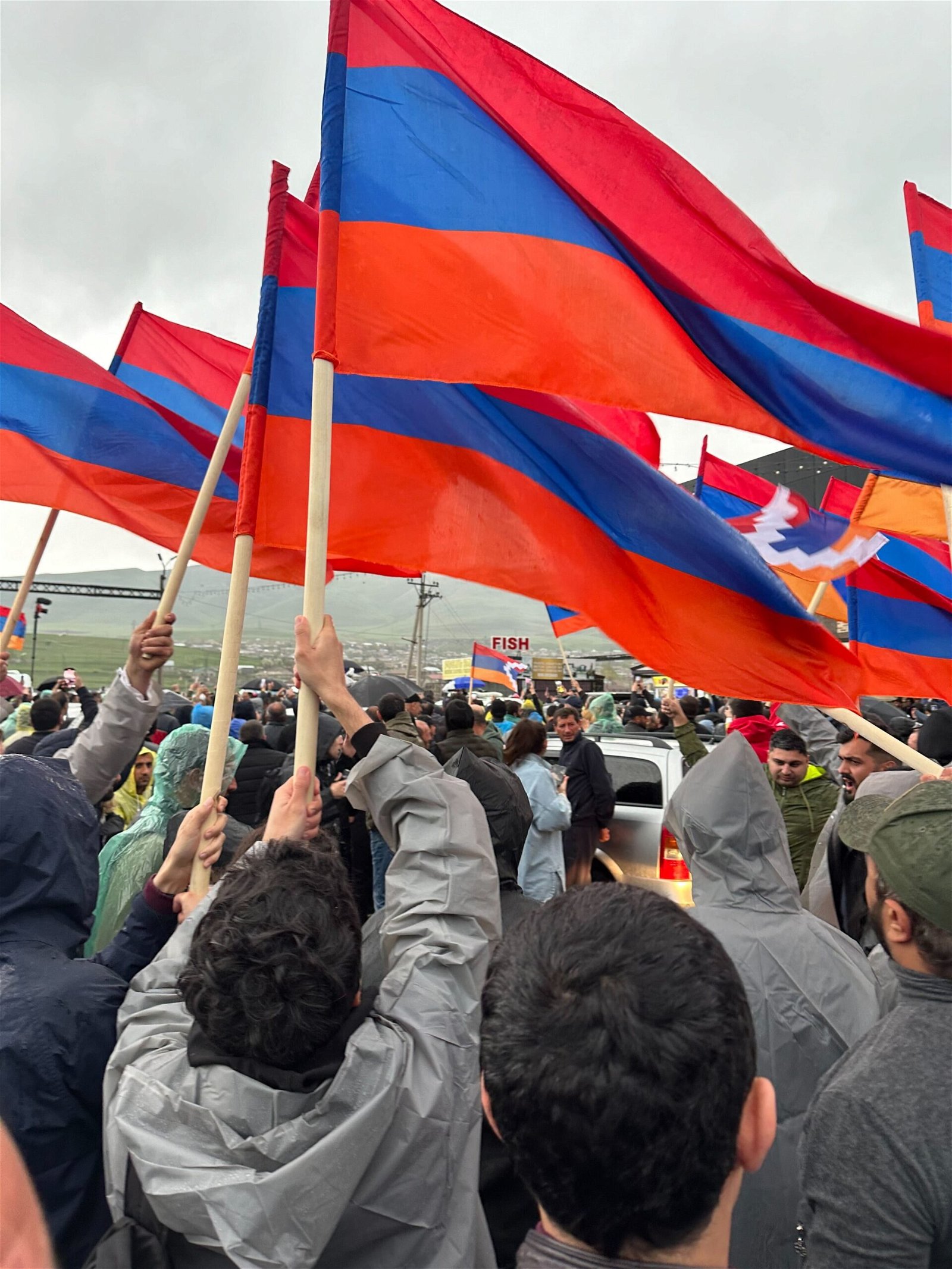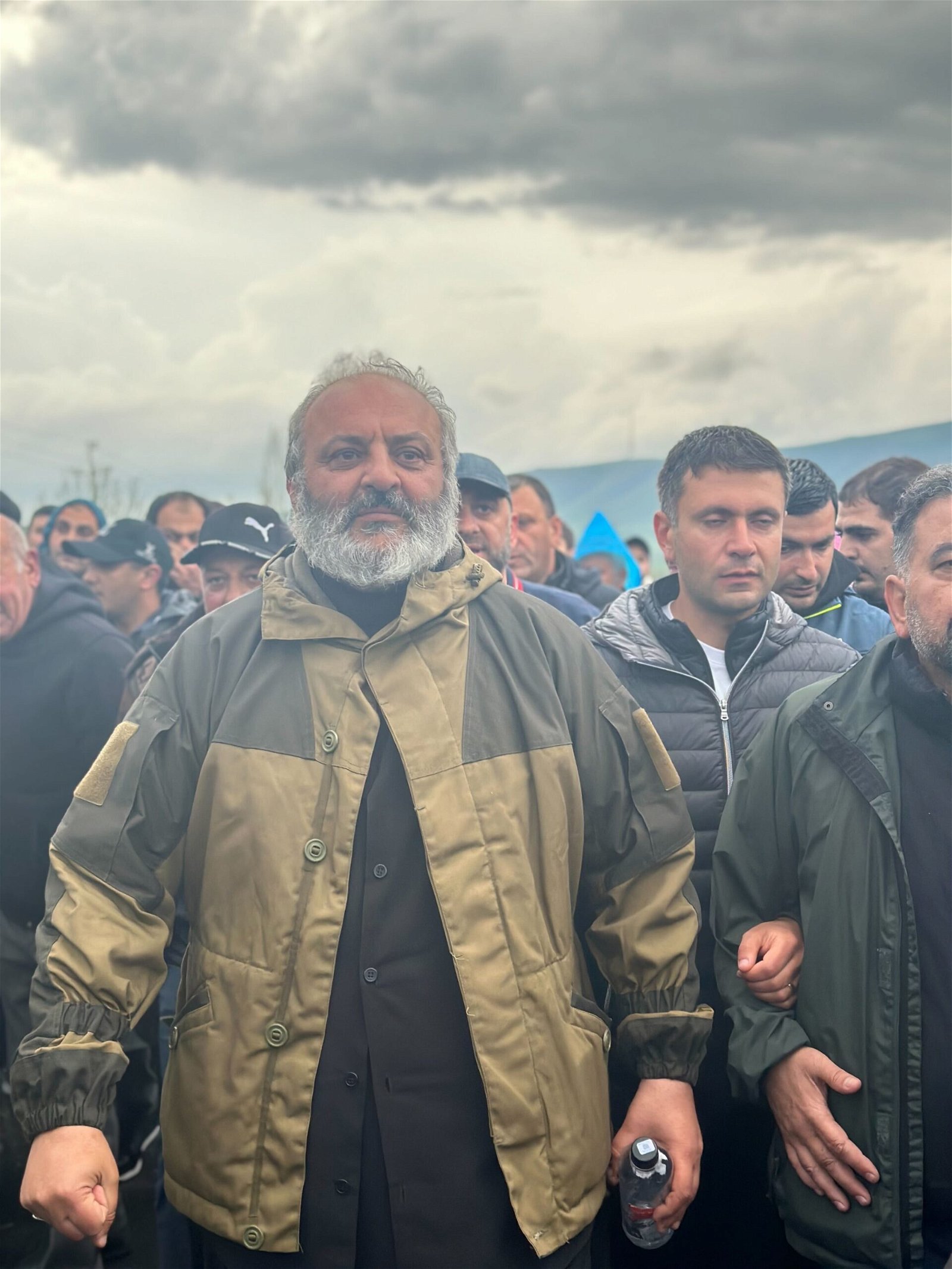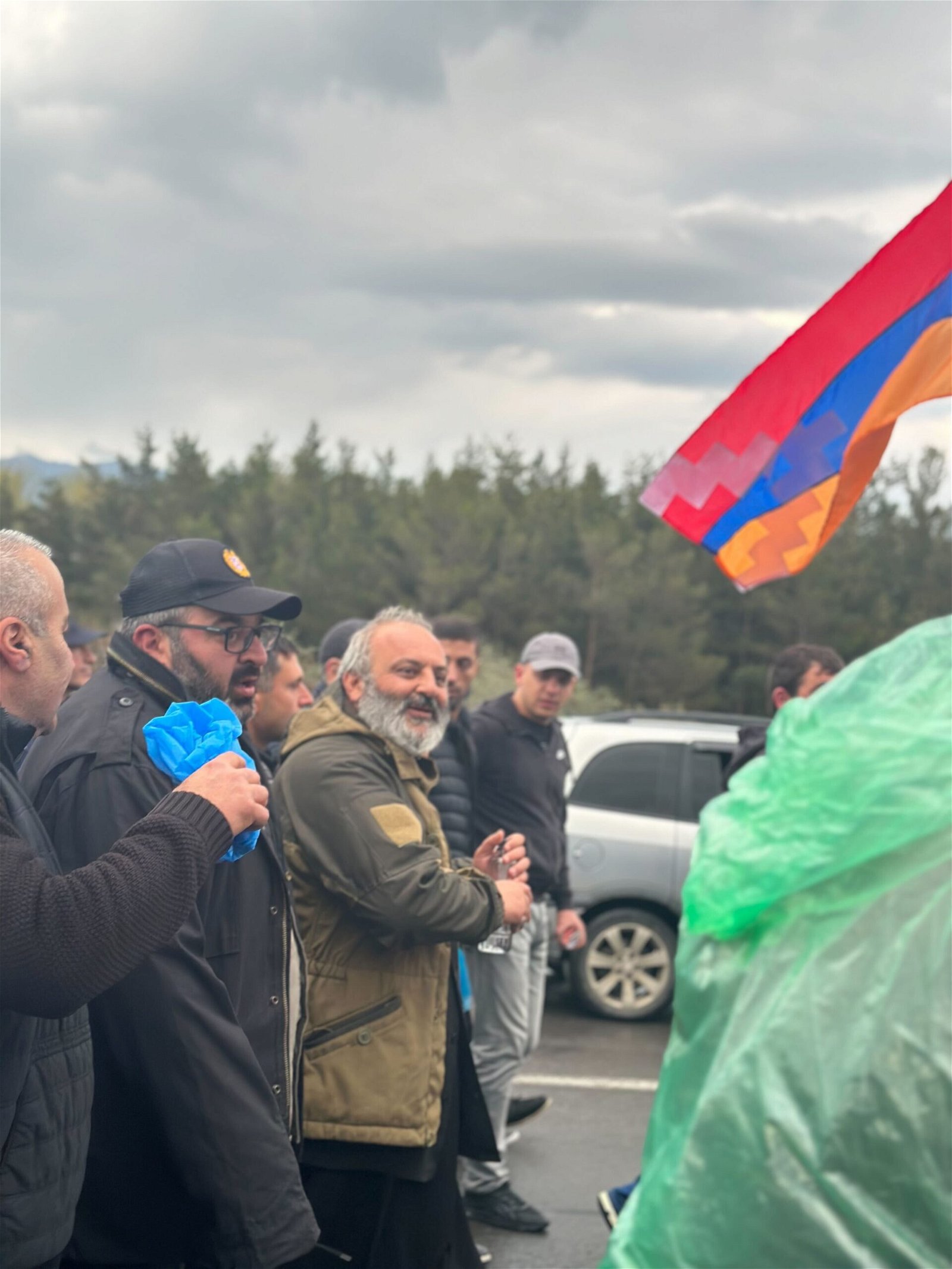 “Tavush for the Homeland” march to Yerevan (Photo: Hoory Minoyan)
“Tavush for the Homeland” march to Yerevan (Photo: Hoory Minoyan)
YEREVAN—Amidst the backdrop of the Armenia-Azerbaijan demarcation and delimitation process in the Tavush region, a grassroots movement known as “Tavush for the Homeland” has emerged as a vocal critic, expressing grave concerns over what it perceives as a threat to Armenia’s territorial integrity and security.
The movement has voiced its opposition to the ongoing border delimitation, asserting that it violates established international norms, including principles outlined in the U.N. Vienna Convention and OSCE guidelines. The movement argues that the unilateral approach taken by Armenian authorities lacks transparency and legal grounding, directing accusations of illegality and unconstitutionality toward Prime Minister Nikol Pashinyan.
Critics of the process also warn against attempting to resolve border issues through unilateral concessions without a comprehensive peace treaty in place, fearing that such actions could lead to heightened security risks for Armenia. They argue that, in the absence of a mutual agreement, Armenia is capitulating to Azerbaijani pressure rather than engaging in a genuine dialogue.
Additionally, concerns have been raised about the potential impact on the safety, property rights and cultural heritage of residents in the affected territories. The demarcation process may disrupt vital infrastructure, including transportation routes and utilities.
The Armenian government has announced plans to cede border areas in the Tavush region to Azerbaijan, as the start of the border demarcation and delimitation process. Tavush residents, in protest of the decision, launched a march from Tavush’s Kirants village to Yerevan this week.
At the forefront of the “Tavush for the Homeland” movement is Archbishop Bagrat Galstanyan, leader of the Diocese of Tavush, who aims to compel the Armenian government to halt the demarcation process. The movement’s future actions are contingent upon the government’s response to these demands.
As the “Tavush for the Homeland” initiative advances towards Yerevan, Archbishop Galstanyan has risen as a central figure. However, he now confronts a storm of controversy.
 Archbishop Bagrat Galstanyan leads the way for the “Tavush for the Homeland” march to Yerevan (Photo: Hoory Minoyan)
Archbishop Bagrat Galstanyan leads the way for the “Tavush for the Homeland” march to Yerevan (Photo: Hoory Minoyan)
Drawing attention for his peaceful demeanor and moral authority, the archbishop says that he aims to foster dialogue across diverse segments of society. “No door in Armenia should remain closed to the bishop. All internal doors must be opened for reasonable speech, because ONE person has opened our nation’s doors to the enemy,” wrote Vahe Hovhannisyan, member of the Alternative Projects Group, arguing that peaceful discourse, rather than confrontation, is the means to effect change.
Hovhannisyan called on the citizenry to facilitate these interactions and overcome internal barriers with words, not force. “The goal is not power, but salvation—the preservation of Armenia’s future,” he wrote.
The ruling party and allied media outlets have launched a campaign of disinformation targeting Archbishop Galstanyan. Accusations range from colluding with Russia and the ARF to securing family exemptions from military service, even though the archbishop has no sons.
The speaker of the Armenian Parliament has joined the chorus of criticism, rebuking the church’s involvement in the movement, a stark departure from his previous support for clerical participation during the “Velvet Revolution” of 2018.
In a recent press conference, Prime Minister Pashinyan refrained from directly naming Archbishop Galstanyan but resorted to inflammatory language, labeling him a “drug addict and a bandit.”
Artak Beglaryan, former state minister of Artsakh, took to Facebook to denounce the recent onslaught of insults and campaigns directed towards Archbishop Galstanyan, labeling them as “highly unacceptable and despicable, particularly when originating from individuals in positions of power and influence.”
In his post, Beglaryan said that Archbishop Galstanyan has conducted himself with integrity and adhered to ethical principles, defending values and ideals that resonate with the homeland. Drawing from personal interactions, Beglaryan praised the archbishop’s value system and noted his exceptional spiritual and national authority and servant leadership.
Beglaryan urged for respectful discourse and ethical persuasion over malicious attacks. He criticized the use of derogatory tactics, including labeling and slander, calling for a higher standard of political culture and professionalism in dissenting opinions.
Beglaryan dismissed accusations that the archbishop is a “foreign agent” as baseless and damaging to national unity. He lamented the decline in political culture perpetuated by the current government, warning against the dangers of internal division and polarization.
Amidst the government’s ongoing efforts to delineate border areas for potential transfer to Azerbaijan, a soldier sustained injuries during demining operations in Kirants, as confirmed by the Armenian Ministry of Defense on May 6.
According to Aram Torosyan, press secretary for the RA Defense Ministry, the soldier was wounded in a mine explosion. Preliminary assessments indicate that his life is not in jeopardy.
Local residents of Kirants also reported the incident, stating that the soldier suffered leg injuries. Kamo Shahinyan, the head of Kirants village, observed an ambulance departing from the demining site.
Following the current regime’s personal attacks toward Archbishop Galstanyan, Archbishop Arshak Khachatryan, representing the Mother See, was also reportedly called to the National Security Service (NSS) for questioning.
This development follows earlier reports alleging government efforts to prosecute participants of the Tavush movement. Archbishop Khachatryan was reportedly summoned to the NSS due to his public criticism of the current administration, notably during his speech on April 24 at the Tsitsernakaberd memorial complex.
In response to inquiries, the Mother See said that Archbishop Khachatryan would address the matter at his discretion.
Meanwhile, in response to the contentious issue of unilaterally transferring territories from the Tavush region to Azerbaijan, the Mother See Holy Etchmiadzin has reiterated its previous criticisms. The Supreme Spiritual Council, in a recent statement, underscored its concerns regarding the delimitation process, warning of the potential new threats it poses to the Armenian people. The statement emphasized the significant unrest sparked within the global Armenian community and particularly among residents of Tavush’s border communities.
“The spiritual leaders of the Diocese of Tavush, led by their diocesan head, faithful to their spiritual mission cannot remain indifferent to the needs of the constituents entrusted to their care,” the statement reads, emphasizing the importance of peaceful expression and adherence to legal avenues for advocacy.
 Archbishop Bagrat Galstanyan leading “Tavush for the Homeland” (Photo: Hoory Minoyan)
Archbishop Bagrat Galstanyan leading “Tavush for the Homeland” (Photo: Hoory Minoyan)
The statement urged law enforcement agencies to maintain order while respecting citizens’ rights. It also called on authorities to pursue a peace process while safeguarding the legitimate demands of the Armenian people without exacerbating security concerns or fostering societal unease.
The Supreme Spiritual Council argued that the delimitation process must occur in a context devoid of armed conflict, with the ultimate goal of securing the safe and undisturbed livelihoods of affected settlements.
“The church will carry on its historical responsibility in strengthening the Armenian state, protecting the rights and identity of its people, and promoting unity and fraternity, thus contributing to the establishment of regional peace,” the statement concludes.
In a show of solidarity, dozens of Armenian diaspora communities and organizations across the globe, from the U.S. to Europe, have voiced support for the “Tavush for the Homeland” movement, with plans for rallies in its favor. Recently displaced Armenians from Artsakh have also joined the movement locally.
As the march approaches Yerevan, set to culminate in Republic Square on the afternoon of May 9, tensions continue to simmer, underscoring the complexities of Armenia’s political landscape and the deep-seated divisions within its society.
The Armenian Weekly remains committed to vigilantly monitoring and providing updates on the ongoing situation.
Author information
Hoory Minoyan
Hoory Minoyan was an active member of the Armenian community in Los Angeles until she moved to Armenia prior to the 44-day war. She graduated with a master’s in International Affairs from Boston University, where she was also the recipient of the William R. Keylor Travel Grant. The research and interviews she conducted while in Armenia later became the foundation of her Master’s thesis, “Shaping Identity Through Conflict: The Armenian Experience.” Hoory continues to follow her passion for research and writing by contributing to the Armenian Weekly.
The post “Tavush for the Homeland” movement headed to Yerevan, protesting land concessions appeared first on The Armenian Weekly.
